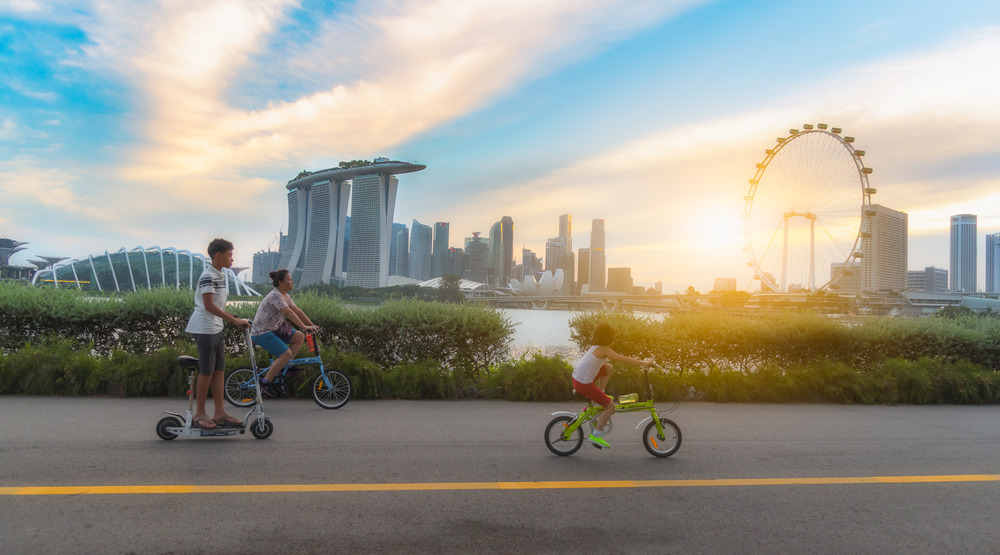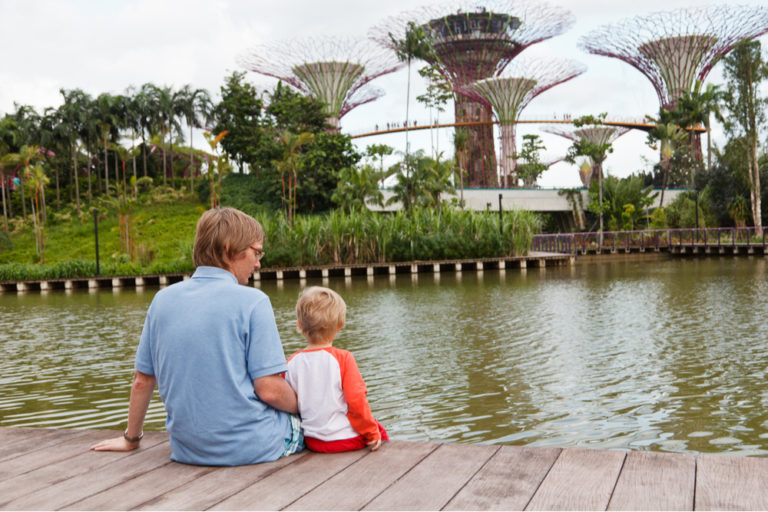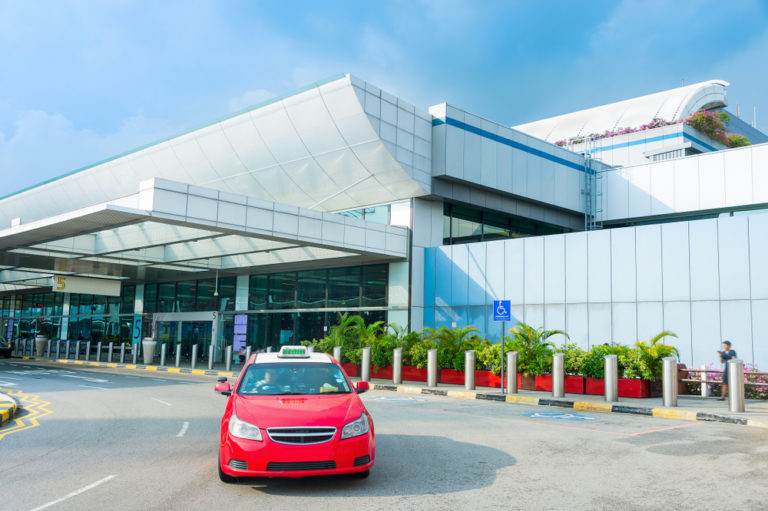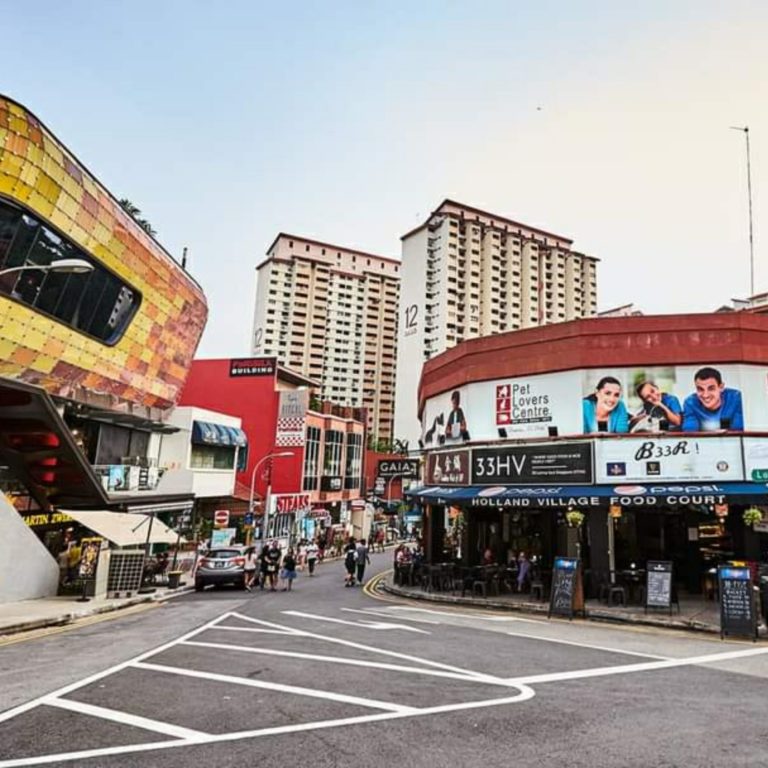
Family Life
- SINGAPORE
MOVING TO SINGAPORE? Mega Guide To Moving And Living In Singapore With Kids
Everything You Need When Making A Move And Living In Singapore

Singapore is never absent in any surveys asking ex-pats for the best countries to move in. In 2021, it ranked 5th in the Internations survey, behind Kuala Lumpur, Malaga, Dubai, and Sydney, respectively. More specifically, it ranked 3rd in the Quality of Urban Living Index and first in the Safety & Politics Subcategory. It’s one of the safest countries in the world (7th), according to the Global Peace Index. With all the praises coming from those living in Singapore, these global rankings come as no surprise.
At Little Steps Asia, we have seen a slew of movements with our family community in Asia to Singapore. This is why we have worked with the team and partners on putting together this super handy guide for families moving to Singapore with kids in tow. This mega guide covers everything you need from paperwork to schooling to taxes and visas to neighborhoods recommended for families! Share it, print it, save it – it’s a beast of information!
While we have you…join the Little Steps Singapore community to stay in the know!
- Sign Up: Weekly email newsletters for Singapore families!
- Join Little Steps Singapore Instagram – Our Community roaming and discovering!
More Handy Resources For Living And Moving To Singapore:
- Latest Covid-19 Requirements In Singapore: Entry into the country requires a full dose of the Covid-19 vaccine, regardless of visa status. Click here for more information.
- Buying Furniture In Singapore: Click here for our favorite shops in Singapore
-

SINGAPORE QUICK FACTS: The Basics And Facts You Need To Know!
About This Fabulous CityBelow are the basics and quick facts about Singapore!
- Population (2021): 5.45 million (only 3.5 million are Singaporean Citizens)
- Currency: Singapore Dollars (SGD); Notes come in denominations of S$2, S$5, S$10, S$50, S$100, S$1,000, and S$10,000. Coins come in 5, 10, 20 and 50 cents and S$1; 1 SGD = 0.74 USD
- National Language: Malay
- Other Languages Spoken: Singlish (Singapore English), English, Tamil, Mandarin
- Ethnic Makeup (2019): 76% Chinese, 15% Malay, 7.5% Indian, 1.5% Others
- Power Plug: The standard electrical current is 220-240 volts AC (50 cycles). Three square pronged power plugs are used here, also called Type G (commonly used in the UK, Ireland, Cyprus, Malta, Malaysia, Hong Kong, etc.)
- Safe Drinking Water: You can drink straight from the tap.
- WiFi and Connectivity: Sim cards can be purchased from different telecommunications booths at the airport if you want to get one upon arrival.
KEY CONTACT NUMBERS IN SINGAPORE:
Knowing the numbers to dial for emergency services is always handy. Here are a few to keep in mind:
- Ambulance Service: 995
- Ambulance Service (non-emergency): 1777
- Civil Ambulance: 6333 3000
- Fire: 995
- Green Crescent Ambulance Service: 6788 8911
- Police: 999
- Police Hotline: 1800 225 0000
- Traffic Police Hotline: 1800 547 1818
- 24-hr Emergency Road Service: 9182 8211
- 24-hr Sewerage Services: 1800 282 4336
- 24-hr Water (Pipes) Services: 1800 284 6600
-

THE ESSENTIALS: The Key Requirements For Anyone Moving To Singapore
The Bits That Matter!There are several reasons why people from different countries move to Singapore. May it be a job offer or business potential, the warm weather, or a better life (safer, cleaner, better education, and healthcare), everyone will have to fulfill several requirements and go through official processing.
VISAS REQUIRED FOR MOVING/LIVING IN SINGAPORE:
- Entering any foreign country require visas. Singapore is not any different. However, not all countries require a visa to enter Singapore for tourist purposes, though they must still meet the entry requirements. Countries that require a visa are listed here and these visas need to be applied for at least 30 days before entry. Entering Singapore on a tourist visa does not guarantee you any jobs. You will still need the work passes to stay in the country for a longer period.
WORK PASSES FOR MOVING/LIVING/WORKING IN SINGAPORE:
- If you are moving to Singapore because of a job offer, there are several different passes that the Ministry of Manpower issues. The Employment Pass or EP is for individuals who are going to earn at least SG$4,500 monthly - for foreign professionals, managers, and executives. If you are keen to start a business in Singapore, the EntrePass is for you. The S Pass is for mid-skilled staff and would require a salary of $2,500 monthly.
- If you have the S Pass, the EP, or the Entrepass, you can get your family to join you in Singapore with the Dependent's Pass. An SG$6,000 minimum salary is required for the S Pass and EP holders, while for the EntrePass, you can bring your spouse (legally married) and unmarried children under 21 years of age. Dependent pass holders can only work if they get an EP or S Pass, which means the same requirements apply.
KEY TIPS BEFORE MOVING TO SINGAPORE:
It's an exciting and daunting task to move from one country to another, so make sure that you have all these covered before making the big move.
- Prepare all the documents needed, especially when you are arriving with a work pass. One missing paper can delay you.
- If you are bringing your children, ensure that you have gone through early application for their school - spots are usually limited and enrollment is done early.
- If you are renting, prepare to dish out up to three months' rent money upfront.
- Taxes are individually submitted twice a year. Do not expect your company to do this on your behalf unless otherwise stated.
- If you plan to drive, get an International Driving Permit (IDP) from the country where your license was issued. This is valid for one year upon arrival in Singapore.
- Be prepared to lather on mosquito repellants - dengue and chikungunya are both present in the country and can be contracted through mosquito bites.
- A Covid-19 vaccine is mandatory.
-

TRANSPORTATION IN SINGAPORE: Everything You Need To Know
Driving In Singapore + Taxi System + Trains In Singapore + FerriesFiguring out how to travel around Singapore is not complex - mainly because the whole country is small (728.6 km²) and the public transportation system is voted as one of the best in the world.
Fares are discounted for students, the elderly, etc., and children that are below 0.9 m in height (accompanied by paying adults) travel free. Open strollers are not a problem to bring when riding the MRT or the buses in Singapore as well.
DRIVING IN SINGAPORE: What You Need To Know
- Renting A Car In Singapore: All car rentals have three standard requirements:
- A valid driver's license. If it's not in English, have it translated. Or, if you have an International Driving Permit (IDP) endorsed by authorized bodies such as the Automobile Association, that could also work for a year from arrival.
- Age is also a consideration. The majority of car rentals allow drivers aged 22 or 23 to 69 to rent. Though some allow those whose ages are 70 to 74 it comes with extra payment.
- If you are a probation plate driver, meaning your license is less than 1 year, the odds are rental companies won't let you rent from them.
- Buying A Car In Singapore: Buying your car in Singapore can be done in 9 steps, here. Note, it is not cheap!
TRAINS: Understanding The MRT And LRT In Singapore
Singapore has 2 train systems, the MRT and the LRT. The MRT has more than 130 stations across 6 lines all over the island. And they are not stopping there. Their goal is to have a station within 10 minutes walking distance for every 8 in 10 households by 2030. Their size will grow from 230 km to 360 km. Sounds overwhelming? Fear not.
- Map: You can download a map or visit their interactive map to see schedules.
- Timing: Trains run from 5.30 am up to midnight every day, and they offer longer service times when there are festivities.
- Where To Buy? Train tickets are available at each station for purchase. You can choose a single/return ticket, or for long-term use, you can get an EZ Link card. This card can be topped up in different outlets like 7-Eleven, SingPost, etc. The most convenient though is to pay with your bank card/phone/smartwatch - without needing to purchase a ticket or the EZ Link card. There is also an option to link a card with your EZ Link, so you can top up online.
BUSES: Understanding The Bus System In Singapore
Riding buses in Singapore is like touring. It gives you a scenic view of the city, whilst enjoying air conditioning to battle the country's humidity and hot temperatures. It's also an economical way to get around. Like trains, you can pay for buses via an EZ Link card or through contactless payment. If you only have cash, make sure it's the exact amount, as they don't have change. If you want to know how much is your fare going to be, you can use the fare calculator.
- Helpful App: Download the MyTransport.SG app (iOS | Android) for bus routes and times. This app also helps you plan your commute daily, whether you're keen on taking the MRT/LRT or the buses or a combination of both.
- Strollers? Most buses will take in open strollers, but you might have to close yours if there are too many passengers on the bus.
- Time Of Operation? Bus timings are also the same as trains, from 5 am to midnight with extensions during festivities.
- Premium Bus Services: Aside from the trunk and feeder bus service, there are also special ones that operate on a different level. Premium Bus Services bring you between major residential estates and key commercial areas (like the CBD) during peak hours to ease transportation overload. As with its name, you pay a premium as well.
- City Direct Services: During weekdays, City Direct Services run between major residential areas and the CBD, during on-peak hours. Midnight bus services such as the NightRider and Nite Owl operate from midnight to 2 am, one way (city to residential areas) during Fridays, Saturdays, and eves of public holidays.
TAXIS AND CAR APPS: Understanding The Taxi System
Singapore has strict rules when it comes to taxis. The best place to hail a taxi or alight from one is in designated taxi stands (except PHCs). However, you can get a street-hail taxi from outside the CBD along the road, with the exceptions of these areas: bus lanes during operating hours, bus stops, and lanes with double zig-zag lines. If your route involves the CBD, please see the map for restrictions, here.
Street-hail taxis are those that can be flagged down on designated streets or wherever allowed and at taxi stands. Here is the list of these kinds of taxis in Singapore:
- CDG Taxi www.cdgtaxi.com.sg
- SMRT Taxi www.smrt.com.sg/Journey-with-Us/SMRT-Taxis/
- Premier Taxi www.premiertaxi.com.sg
- Prime Taxi www.primetaxi.com.sg
- TransCab www.transcab.com.sg
Ride-hail taxis are those that are booked, either via app or via call bookings. Do note that some taxis have booking fees, on top of the actual fare. These are the ride-hail taxis in Singapore:
- CDG Taxi www.cdgtaxi.com.sg
- SMRT Taxi www.smrt.com.sg/Journey-with-Us/SMRT-Taxis
- Premier Taxi www.premiertaxi.com.sg
- Prime Taxi www.primetaxi.com.sg
- TransCab www.transcab.com.sg
Private Hire Cars (PHC)
- Grab www.grab.com/sg
- Gojek www.gojek.com/sg
- Ryde www.rydesharing.com
- TADA tada.global
BIKING IN SINGAPORE:
It's not The Netherlands, but Singapore has cycling paths throughout the country. They currently have 460km of cycling paths and aim to reach 800km in 2023. Whether you use it for recreation or as a means of transport, here are the currently available routes:
- Ang Mo Kio - Lornie (PDF, 762kb)
- Bedok - Tampines (PDF, 506kb)
- Bukit Gombak - Bukit Panjang (PDF, 326kb)
- Geylang - Marine Parade (PDF, 418kb)
- Jurong (PDF, 430kb)
- Marina Bay - Rochor (PDF, 492kb)
- Pasir Ris - Changi (PDF, 278kb)
- Punggol - Sengkang (PDF, 2.0mb)
- Wodlands (PDF, 2.0mb)
- Yishun (PDF, 1.6mb)
FERRIES IN SINGAPORE:
Traveling from Singapore to Indonesia for that little weekend getaway couldn't be easier. There are three terminals in the country, two of which are regional and one domestic. The domestic terminal is located at Pasir Panjang for people working at industrial islands, offshore. The two regional ones are the Harbourfront Ferry Terminal and the Tanah Merah Ferry Terminal. At the moment of writing this article, Harbourfront Ferry Terminal is not servicing any cruise and regional ferry operations.
- Ferry Schedules: Ferry schedules departing from Tanah Merah Ferry Terminal can be found here.
- Renting A Car In Singapore: All car rentals have three standard requirements:
-

JOB HUNTING IN SINGAPORE: Everything You Need To Working In Singapore
Moving to Singapore without a prior job offer tends to be difficult, as the job market is competitive. And as of July 2018, any position that comes with a fixed salary that is not higher than 15,000 SGD/monthly needs to be posted on their national jobs portal for a minimum of 14 days before opening it up to foreigners. Also, in March 2020, the Singapore Ministry of Manpower announced more requirements and decreased quotas for getting an S Pass or EP.
With that in mind, here are some tips on job hunting as a foreign national in Singapore:
- If you are currently working in an international company with a branch in Singapore, requesting an overseas transfer could be one of the easiest ways to enter the system. Always check for openings or make sure that your desire to move has been sent to your local HR so they can contact you right away.
- If you want to visit Singapore to do your job hunt, this has to be planned ahead of time. Before booking your flight, make sure you have several interviews already lined up. Flying to the country without secured interviews and hoping to land them there is not ideal as the application process takes time. If you are keen on attending job fairs, this might also not work as foreign applicants are usually not considered in these events.
- Search jobs in online work portals, such as LinkedIn, Indeed, JobsDB, and JobStreet. Some jobs indicate being a Singapore Permanent Resident (PR) or a citizen as a requirement so you can remove these jobs from your option.
- Network, network, network. Establishing connections and meeting people is still a good way of getting information. You'd be able to place your best foot forward and you never know who is at the right place and at the right time.
-

WHERE TO LIVE IN SINGAPORE?: Popular Neighborhoods For Families And Kids In Singapore
One of the first things that you would need when you move to Singapore, or any other country for that matter is a place to live in. Narrowing down the area where you want to live may have something to do with proximity to your job, to your child's school, or whether you want to be surrounded by a hub that never sleeps or a residential area that's often not disturbed.
Neighborhoods in Singapore:
Singapore is divided into 5 districts - North, Northeast, East, West, and Central. Each district has its charm and flavor and you are sure to find a place that you can call home within these districts.
- For a quick look into the best neighborhoods in Singapore, click here to learn more.
Property Agencies In Singapore:
Choosing a neighborhood to live in could go hand in hand with a property that piqued your interest. Your next decision would be whether you would buy a property or rent it. The easiest way to get through it would be by consulting with property agencies in Singapore.
There are three main kinds of properties, private properties, housing and development board (HBD) flats, and executive condominiums (EC). Foreigners cannot buy HBD flats, these are exclusive to Singaporean citizens or permanent residents, but they can buy ECs that are at least 10 years old and private apartments. But before they can purchase any kind of property, the government will have to approve it first.
RENTING A PROPERTY, HOME, CONDO IN SINGAPORE:
If you decide to go the rental route, your prep work would include setting a budget against your chosen location and knowing what you need out of the rental. It is not an unknown fact that locations closer to the central business district are more expensive. If your work area is a bustling hub, you might save a lot of time choosing to rent a space closer to it, but it comes with a cost.
Here are rental tips and reminders when renting in Singapore:
- Renting a condominium is more expensive than a housing and development board (HBD) flat. Renting a house will cost more, but you get the privacy that you need. You would need to show a work permit or any document validating your long-term stay when you want to rent, so make sure you have these documents ready.
- There are two documents that you would be signing when you rent. One is a Letter of Intent (LOI) and the second is the Tenancy Agreement (TA). The LOI is written by the tenant and the TA is coming from the landlord.
- Read your Tenancy Agreement (TA) thoroughly and do not hesitate to ask questions about it. Some might indicate vague things like "no immoral activities" and it pays to ask the property owner to define these things for you before signing. Especially if they have imposed a set of rules.
- Some landlords could ask for up to three months' rent upfront, as aforementioned. It's important to consider the amount when budgeting. Though the standard is a 1-month advance and a 1-month deposit upon moving in. If you are going through an agency, there is always an agency fee.
- Always pay either with a bank transfer or a check, otherwise, if you are paying cash, ask for a receipt or proof that you paid. Better safe than sorry.
- Before signing that contract, look around the immediate surrounding area. The rental price should be the same, if not with a 10% difference. If you're renting an HBD, you can check prices here. For private properties, click here.
- Most owners choose to rent their properties long-term, which means at least a year, though contracts that run for two years will be cheaper. You may find properties that can be rented for 6 months (rare), but these will be more expensive. So when you rent a place, imagine yourself staying there for at least a year before you can move again.
- The law states that you need to get your air conditioner serviced every 3 months. Get the responsibility sorted out with your property owner. Should this be something that you, as a renter, should pay for, or should it be the owner?
- Decide on the limit amount for minor repairs. Ideally, $200/year is reasonable. If not, the landlord might ask you for the full cost of repairs which can be thrice this amount.
- Make sure that the maintenance company in the TA is not limited to just one or two companies. If your AC breaks down and the company that your landlord chose for repairs is booked for a week or two, you will not have any AC until then.
- If you chose a fully furnished place, inspect the list of furniture (and other items already in the rental) and catalog them. Don't be afraid to take pictures and send them to your landlord when your first move in. You can never be too careful. Normal wear and tear should not cost you your deposit, either.
- If you want to do the rental search on your own, here are a few apps/websites that you can use:
SERVICED APARTMENTS IN SINGAPORE:
Not yet sure if you are ready for the hustle and bustle of renting and whether or not you want to stay in the country for long? Worry not, serviced apartments are the way to go.
No need to worry about monthly bills, setting up your internet and cable subscription, or getting your air conditioning cleaned. These serviced apartments are like hotels, but homier and can be rented with just one click!
- Check out the 10 best family-friendly serviced apartments in Singapore, here.
BUYING AND OWNING A PROPERTY IN SINGAPORE:
As a foreigner, your buying power is limited in terms of properties. You can only purchase private ECs (at least 10 years old) and apartments, landed properties on Sentosa Cove, and landed properties with special permission from Singapore Land Authority. In terms of commercial properties, there is no restriction for a foreigner. Commercial properties include offices, shops, hotels, warehouses, shopping malls, and factories.
However, if you are a foreigner in Singapore with an EP, SP, Entrepass, you can apply for a Singapore Permanent Resident (PR) status. Once your PR is approved, you have more options.
-

SETTING UP UTILITIES AND WIFI IN SINGAPORE: Home Essentials!
Setting up your utilities in Singapore can be done by opening an account with the SP Group - even if you are not buying all your utilities from them. It makes everything easier instead of applying separately with the Public Utilities Board (PUB) Singapore or CityEnergy.
Take note that even though you are opening an account with SP, it does not mean that you need to avail yourself of their electricity services. Ever since the OEM (open electricity market) initiative, there are now at least 20 other players in the market. As for gas, if you do not want the LPG gas canister option, there is CityEnergy.
One reason why you need to set up an account with SP is that you can pay for all services through the SP app. And the most important reason is that you simply need the account before setting up the others, it is a requirement.
The ideal time to set up your SP account is at least 2 weeks before you move in, as it will take two weeks before the supply can be turned on. If you are moving to an HBD made-to-order flat, a turn-on appointment is not necessary. If you are moving into a resale HBD flat or other residential properties, the SP account holder or a representative has to be present during turn-on. If you need to reschedule your turn-on appointment, you can click here.
How to set up your SP account:
- Open an SP account in three ways:
- Download the SP app. You would need to fill out your personal details, upload photos of your NRIC or FIN, and may need to attach property ownership and/or tax documents.
- Open an account via SP Utilities Portal using MyInfo/MyInfo Biz (for Singaporeans and Singaporean PRs).
- Do the old-school way of heading over to an SP Customer Service Centre with your documents.
- You would need to download the form and fill it out.
- You also need the following documents: Proof of occupancy of your home, and a copy of your IC or FIN.
- SP Address: 490 Lorong 6 Toa Payoh #09-11, HDB Hub Biz Three Lift Lobby 1, Singapore 310490
- Opening hours: Monday to Friday, 8.30 am to 5 pm, Saturday, 8.30 am to 1 pm. They are closed on Sundays and Public Holidays
- Take note of the security deposit requirements, the amount depends on your residential property and whether you are a Singaporean PR or not.
- The progress of your application can be tracked on the app.
CityEnergy
To set-up up an account with CityEnergy for your residence, call 1800 555 1661 or make an online appointment. Take note that you can only open your CityEnergy account after your SP account has been set up.
Paying for your SP bills
- Via GIRO: print the application form here and send it via mail or set up a GIRO account via your online banking account.
- Credit card or Internet banking
- AXS machines and/or AXS Mobile App
- SP Services center
- SingPost offices or 7-Eleven stores
You can manage everything on the SP app and keep track of your consumption as well.
Setting Up Your WiFi At Home In Singapore:
Before you can set up your WiFi, you would have to choose your provider.
- Each provider has a different sign-up fee, and you can choose from a one-year or two-year contract. Some of the providers offer no contracts, which means you can stop the connection at any time - though this comes with a higher monthly payment.
- To help you choose, most households opt for the 24-month contract and 1 Gbps fiber broadband. The choice boils down to the freebies that each provider gives and of course, your other preferences (router brand, etc).
There are currently six providers in the market:
- M1, www.m1.com.sg/home-broadband
- MyRepublic, www.myrepublic.net/sg/broadband-promotions
- SingTel, www.singtel.com/fibre-broadband-plans
- StarHub, www.starhub.com/personal/broadband
- ViewQwest, www.signup.viewqwest.com/broadband
- WhizComms, www.whizcomms.com.sg
- Open an SP account in three ways:
-

GETTING A PHONE AND SETTING UP YOUR MOBILE IN SINGAPORE: Telecommunications!
If you already have a phone, getting a SIM-only mobile plan will be your best option. A SIM-only plan is a package that gives you a fixed amount of data, talk time, and SMS per month, and is usually postpaid.
However, if you want to buy a new phone along with a postpaid plan, that is also possible. Each telco network has different offers to suit your needs, including a flexible family plan.
Here are the top options for a telco network providers in Singapore:
- Circles.Life, www.circles.life/sg/plans
- StarHub, www.starhub.com/personal/mobile
- GOMO, www.gomo.sg/mobile
- Zero1, www.zero1.sg/plans
- MyRepublic, www.myrepublic.net/sg/mobile
- M1, www.m1.com.sg/mobile
- SingTel, https://www.singtel.com/personal/products-services/mobile
- Gorilla Mobile, www.gorilla.global/sg/mobile
-
FAMILY LIFE: Schools, Fun Things To Do In Singapore
Singapore is arguably one of the best child-friendly countries in the world. From a wide variety of school options to child-friendly places, you will never run out of activities and things to do for your children.
Schools In Singapore: Finding The Right School!
Singapore's educational system is continuously the top-ranked in the world, most especially its Maths program. Choosing a school should not be that difficult as well, given the wide array of curriculums and international schools present in the country. Not to mention their accessibility within the whole island.
- Application Guide With School Contacts: Check out our school application guide, here.
- Preschools In Singapore: An exhaustive list of preschools can be accessed here.
- Guide To Applying To Schools In Singapore: please click here for the guide.
- Top International Schools In Singapore: Top primary and secondary schools - click here.
Things To Do With Kids In Singapore:
For the ultimate guide, we have put together an amazing downloadable which has the best of activities in Singapore for kids and can be easily printed.
- Indoor Playgrounds In Singapore: Indoor playgrounds can serve as a haven from the heat of the sun or when it rains like cats and dogs. Here are some of our top picks for indoor playgrounds in Singapore or you can check out our list, here and here.
- Outdoor Parks And Playgrounds In Singapore: You will never run out of outdoor playgrounds to choose from. Singapore has a complete list on the official National Parks website, here. And best of all, they are free and open from 6 am to 11 pm (unless otherwise stated) though the parking light hours are restricted from 7 pm to 7 am. We have narrowed down the list with some of our favorites.
- Top Playgrounds In Singapore: Click here for our favorite playgrounds in Singapore.
- Top Parks In Singapore: Click here for some of our favorite parks!
-

DOMESTIC HELPER HIRING AND OTHER HOME SERVICES IN SINGAPORE:
HIRING DOMESTIC HELPERS:
- Guide To Hiring Helpers In Singapore: If you'd like to get a domestic helper for your chores at home or help take care of your child/ren, we have listed a quick guide for you, here.
OTHER HOME SERVICES IN SINGAPORE:
Living in Singapore has certain requirements that you may not find in other countries, like having your air conditioning at home serviced every so often. The good news is, services such as this can easily be availed. Here is a list of companies and the services that they offer:- Butler: Butler's vision is to bring hospitality to your doorstep is now a reality. With property management and home cleaning services, this company is award-winning.
- Butler, 808 French Road #07-167 Singapore 200808, +65 3129 2133, hello@getbutler.com, www.getbutler.com
- Defects Check: Identifying defects in a home or a commercial or industrial building saves lives - and you cannot put a price on safety.
- Defects Check, 58, Ripley Crescent Singapore 556234, +65 6638 0940, sales@defectscheck.sg, www.defectscheck.sg
- Fixwerks: If there was a Mr. Fix It for Singapore, it would probably be this company. Their wide array of services can speak for itself - freezer repairs to carpentry services - there is probably nothing they cannot do.
- Fixwerks, 55 Serangoon North Avenue 4, #06-11, Singapore 555859, +65 6765 8890, enquiries@fixwerks.com, www.fixwerks.com
- Handyman Services Singapore: Need a hand with painting or carpentry? How about a plumbing issue or an electrical problem? This father and son team does all.
- Handyman Services Singapore, +65 8282 6888, www.handymanservices.sg
- Helpling: Looking for a handyman or air-conditioning services? Post-renovation cleaning or disinfection? Or what if you simply need help with your daily chores? Look no further, help is on the way.
- Helpling, download app for Apple/Android, 120 Robinson Road, #09-01,Singapore 068913, +65 3158 3871, contact@helpling.sg, www.helpling.com.sg
- Keep Calming And Laundry On: From wedding gowns to carpets, sarees to winter wear - they have got it covered.
- Keep Calm and Laundry On, +65 9755 7119, sales@keepcalmandlaundryon.com, www.keepcalmandlaundryon.com
- Rentokil Pest Control: Founded in 1964, Rentokil is one of the country's leading pest control companies that can service residential, commercial, and industrial areas.
- Rentokil Pest Control, +656 012 9729, www.rentokil.com.sg/contact-us/
- Urban Company: From car washing to manicures and pedicures, home cleaning to massages, this company can provide all these and more.
- Urban Company, download app for Android/Apple, help@urbancompany.com, www.urbancompany.com/singapore
-

HEALTHCARE IN SINGAPORE: Get To Know The System In Singapore
HIRING DOMESTIC HELPERS:
- Guide To Hiring Helpers In Singapore: If you'd like to get a domestic helper for your chores at home or help take care of your child/ren, we have listed a quick guide for you, here.
OTHER HOME SERVICES IN SINGAPORE:
Living in Singapore has certain requirements that you may not find in other countries, like having your air conditioning at home serviced every so often. The good news is, services such as this can easily be availed. Here is a list of companies and the services that they offer:- Butler: Butler's vision is to bring hospitality to your doorstep is now a reality. With property management and home cleaning services, this company is award-winning.
- Butler, 808 French Road #07-167 Singapore 200808, +65 3129 2133, hello@getbutler.com, www.getbutler.com
- Defects Check: Identifying defects in a home or a commercial or industrial building saves lives - and you cannot put a price on safety.
- Defects Check, 58, Ripley Crescent Singapore 556234, +65 6638 0940, sales@defectscheck.sg, www.defectscheck.sg
- Fixwerks: If there was a Mr. Fix It for Singapore, it would probably be this company. Their wide array of services can speak for itself - freezer repairs to carpentry services - there is probably nothing they cannot do.
- Fixwerks, 55 Serangoon North Avenue 4, #06-11, Singapore 555859, +65 6765 8890, enquiries@fixwerks.com, www.fixwerks.com
- Handyman Services Singapore: Need a hand with painting or carpentry? How about a plumbing issue or an electrical problem? This father and son team does all.
- Handyman Services Singapore, +65 8282 6888, www.handymanservices.sg
- Helpling: Looking for a handyman or air-conditioning services? Post-renovation cleaning or disinfection? Or what if you simply need help with your daily chores? Look no further, help is on the way.
- Helpling, download app for Apple/Android, 120 Robinson Road, #09-01,Singapore 068913, +65 3158 3871, contact@helpling.sg, www.helpling.com.sg
- Keep Calming And Laundry On: From wedding gowns to carpets, sarees to winter wear - they have got it covered.
- Keep Calm and Laundry On, +65 9755 7119, sales@keepcalmandlaundryon.com, www.keepcalmandlaundryon.com
- Rentokil Pest Control: Founded in 1964, Rentokil is one of the country's leading pest control companies that can service residential, commercial, and industrial areas.
- Rentokil Pest Control, +656 012 9729, www.rentokil.com.sg/contact-us/
- Urban Company: From car washing to manicures and pedicures, home cleaning to massages, this company can provide all these and more.
- Urban Company, download app for Android/Apple, help@urbancompany.com, www.urbancompany.com/singapore
-

SUPERMARKETS FOR GROCERIES AND DINING IN SINGAPORE WITH KIDS:
Whether you want your groceries delivered or your meals gluten-free in restaurants, our food & dining guide for Singapore has everything you will ever need.
Supermarkets In Singapore For Groceries:
You will never run out of options when grocery shopping in Singapore. From local faves to international ones like Shine Korea, German Market Place, Scoop Wholefoods, or The French Grocer, here is a list of supermarkets for grocery shopping in Singapore, whether online or retail.
- Groceries And Supermarket Apps In Singapore, Click here!
- Meat And Seafood Delivery In Singapore, Click here!
- Vegetable And Fruit Delivery In Singapore, Click here!
Best Restaurants Catering To Kids In Singapore:
If it's not yet that apparent, Singapore is a haven for families with kids. The options are endless when it comes to things to do with them, and it goes without saying, also dining places.
- Restaurants With Playrooms In Singapore: If you are looking for family-friendly restaurants with playrooms or playgrounds for kids, click here.
- Breakfast With Kids In Singapore: For cozy restaurants that serve breakfast and are family-friendly, look no further, our list is here.
- Best Family-Friendly Restaurants In Singapore: You can check it out here.
-

BANKING IN SINGAPORE: Setting Up Your Bank Account In Singapore
Opening a bank account is one of those things that you need to do regardless of the country that you move to. And with so many banks to choose from in Singapore, you might find yourself overwhelmed. But worry not, narrowing down your options can be done by deciding which feature is best for you.
Banking in Singapore
- How to set up a bank account in Singapore?: Here is our banking guide in Singapore, including our top best bank accounts.
- Savings Accounts For Kids: If you are looking for a savings account for your kids, click here.
- Financial Planners In Singapore: For those in need of financial planners, we also have a list, here.
Setting up a PayNow and a PayLah
It's quite like Venmo, but it isn't exactly like it as well. PayNow and PayLah! are two popular services dealing with money in Singapore. PayNow's service is more geared toward fund transfers while PayLah! is a digital wallet. And setting up either is a walk in the park.
- PayNow: PayNow is a funds transfer service that is available to customers of the following banks: Bank of China, Citibank, DBS/POSB, HSBC, ICBC, Maybank, OCBC, Standard Chartered Bank, UOB. With this service, you can receive or transfer money to anyone registered to the aforementioned banks using only your recipient’s mobile number or NRIC/FIN number. You can also use PayNow to pay participating merchants - they could be hawker stalls, grocery stores, or a restaurant.
- How To Register Your NRIC/FIN On PayNow
- Choose your preferred bank account to receive money.
- Log in to your Internet banking or mobile banking app. There should be a PayNow option under the ‘payment and transfer’ or ‘more services’ tab.
- Register your NRIC/FIN on PayNow.
- You can also refer to your respective bank’s website for specific details on how to register your NRIC/FIN on PayNow. If you do not have Internet or mobile banking, you can contact your bank directly to register for PayNow.
- How To Register Your NRIC/FIN On PayNow
- PayLah! PayLah! is a DBS lifestyle digital wallet that is available to both bank account holders and nonbank account holders of DBS. As long as you are a Singaporean citizen or a Permanent Resident, you can use this app. The easiness of using it is unparalleled - you can transfer money via a QR code or just with a mobile number to all PayLah! users. An advantage of DBS bank account holders is that they can use DBS banking services right from the app.
- How To Register For PayLah!
- Download the PayLah! app - App Store or Google Play
- If you have a DBS/POSB digibank account, you can link it to your PayLah! app. If you are not, you can sign up via MyInfo.
- Follow the instructions and pick a password for your PayLah! mobile wallet.
- If you have questions or any other concerns, it is best to contact your participating PayNow bank or consult the DBS page for PayLah!
- How To Register For PayLah!
-

PETS IN SINGAPORE: What You Need To Know About Pets In Singapore
Bringing a pet or pets to Singapore is not an impossible feat, however, there are certain requirements and a process to ensure that your pet enters the country safely.
How To Bring Your Pet/s To Singapore
Bringing a pet or pets to Singapore is not an impossible feat, however, there are certain requirements and a process to ensure that your pet enters the country safely. For complete details, please refer to this list. All applications for bringing pets into Singapore have to be processed by an AVS (Animal and Veterinary Services) recognized pet agent. Here is a list from their site.
Now that your pet has landed in Singapore, your next steps are as follows:
- The pet will undergo inspection by an AVS officer at the respective points of entry:
- by air - Changi Animal & Plant Quarantine Station
- by land - Tuas Checkpoint
- If your pet requires quarantine, AVS will transport it to the Animal Quarantine Centre (AQC) and will be released after the required quarantine period. If it does not require quarantine, it will be released after inspection.
Living With A Pet In Singapore: Handy Resources
- The pet will undergo inspection by an AVS officer at the respective points of entry:
-

UNDERSTANDING TAXES IN SINGAPORE:
All income earned in Singapore is taxable. The amount will depend on how much you earn and if you are a tax resident or a non-resident.
Another thing to remember is that taxes are calculated based on the YA (Year of Assessment), which is the earnings from the previous year. For example, YA 2021 is the tax on your income from January 1, 2020, to December 31, 2020.
Tax Resident
- You are a tax resident if you're a Singaporean Citizen or Singapore Permanent Resident or if you're a foreigner that worked or stayed in Singapore for at least 183 days or continuously for 3 consecutive years.
- If you are a foreigner who worked in Singapore for a continuous period straddling 2 calendar years and at least 183 days you are also a tax resident. This rule does not include directors of a company, public entertainers, or professionals. To count the exact number of days, include weekends, public holidays, and even temporary absences such as business trips or vacation days. You also include the moment you were physically present inside of Singapore, even if it's not counted as an employed day.
- Also note that having a higher salary means higher taxes as well, for resident taxpayers. Here is a link from the IRAS (Inland Revenue Authority of Singapore) for sample tax calculations.
Non-resident Tax
- There are two main categories for non-resident taxes. The first one is the tax on your employment income. If you are employed but a non-resident, you are taxed at a flat rate of 15% or the progressive tax rate (which can be seen here), with the higher tax amount taking precedence.
- The second category is the tax on director's fees, consultation fees, and rental income from properties, to name a few. This is currently at 22% but will be raised to 24% from YA 2024.
- For withholding taxes of non-residents, the complete rates are listed here, and vary depending on the job performed.
-

INFORMATION ON RETIREMENT (CPF FUND) IN SINGAPORE: Central Provident Fund (CPF)
Central Provident Fund (CPF): You can check out the CPF website, here.
- According to the Ministry of Manpower, the Central Provident Fund (CPF) is a mandatory social security savings scheme and is one of the pillars of Singapore’s social security system.
- The CPF contributions are payable by employers for Singapore citizens (SCs) and Singapore permanent residents (SPRs). Your employer is responsible for making the payment to CPF.
- For example, if you are earning a monthly salary of $6000, your contribution per month to your CPF is 20% of your salary, which is $1200. Therefore, your take-home salary after CPF deductions will be $4800.
- Aside from this, your employer needs to contribute 17% of your salary (not deducted from the remaining $4800), which amounts to $1020. Your total contribution per month to CPF with a $6000 monthly salary is $2220.
- You are eligible to withdraw your CPF savings from age 55, and you will start receiving monthly payouts when you are age 65. The CPF basic retirement sum is $88,000 for members who turn 55 in 2019.
-
Want More?
Little Steps Asia knows what families need.
Sign up for our email newsletters to get the most out of Asia!
-
Singapore
Join The Ultimate Pickleball And Badminton Festival In Singapore – Fun For All Ages!
First-Ever Pickleball & Badminton Fest!2024 Jul 06 - 2024 Jul 06 -
Singapore
Paint With Purpose And Have Some Fun With Art For Good Singapore
Join An Art Jam From Now Until July 28 At Frasers Property Malls!2024 May 24 - 2024 Jul 28 -
Singapore
Top Family-Friendly Singapore Events: June 2024 Activities In Singapore
Explore Kid-Friendly Fun and Adventures All Month Long2024 Jun 01 - 2024 Jun 30 -
Singapore
Join The Hello Kitty 50th Run Fest 2024 In Singapore: Ultimate Family Fun!
Celebrate Five Decades Of Fun And Friendship2024 Aug 24 - 2024 Aug 25 -
Singapore
Mega Despicable Summer: Universal Studios Singapore Celebrates Despicable Me 4 Release!
July 1 to August 11, 20242024 Jul 01 - 2024 Aug 11 -
Singapore
Bubble Fiesta At Adventure Cove Waterpark: Singapore’s Biggest Bubble Festival 2024
Beat The Blistering Heat On Our Island2024 Jun 01 - 2024 Aug 11 -
Singapore
Experience Singapore’s Hello Kitty Cable Car Cabins Birthday Bash: June-December 2024!
A Unique Cable Car Experience2024 Jun 01 - 2024 Dec 31 -
Singapore
Discover The Hottest June Holiday And Summer Events In Singapore 2024
From Indoor Play To Outdoor Fun Plus Musicals And More!2024 May 01 - 2024 Aug 01 -
Singapore
Celebrating SAF Day: Become A Solider At Singapore Discovery Centre
Program Runs Until June 23. Admission Is Free!2024 May 25 - 2024 Jun 23 -
Singapore
The Gruffalo: A Must-See Musical Adventure Returns To Singapore
A Timeless Tale Of Bravery And Wit2024 Jun 14 - 2024 Jun 23
SIGN UP
Singapore Tips, Deals + Events.
Got kids? Little Steps Asia gives you the scoop on all the things to do and see with babies, toddlers, and kids in Hong Kong, Singapore, Kuala Lumpur, Bali, Jakarta, Macau, and beyond. From family-friendly hotels, kids and baby shops, the best schools and after school activities, pregnancy tips and meet-ups and more – we have you sorted.
Sign up to receive the free Little Steps email newsletter packed with news, offers, and hidden treasures for Singapore families.

© 2024 Little Steps Asia. All rights reserved.


















